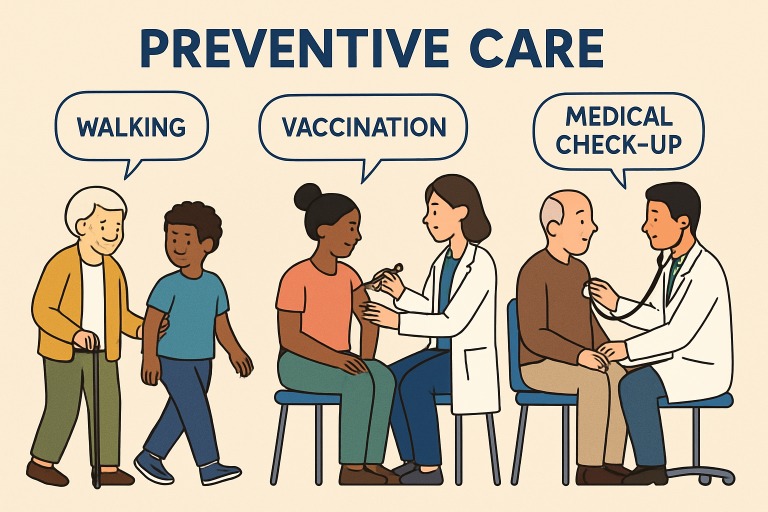Understanding Preventive Care
Preventive care is the proactive management of your health, focused on warding off diseases, identifying risks early, and helping you maintain wellbeing. These services, often coordinated by trusted providers such as Springfield, NJ doctors, include regular check-ups, screenings, immunizations, and counseling. Rather than only seeking medical help when symptoms arise, preventive care bridges the gap by promoting early detection, making illnesses easier to treat, and sometimes preventing them altogether.
Prevention is effective across all ages, from newborn immunizations to adult screenings. This lifelong strategy detects issues early and promotes healthier habits, benefiting individuals and communities. Its goal is to maximize healthspan and reduce the years lost due to disease. By identifying risk factors, doctors can create personalized prevention plans, resulting in improved health outcomes. Prevention also lessens the burden on families, employers, and healthcare, cutting costs and supporting societal productivity.
The Impact on Lifespan and Healthspan
Preventive care extends life and healthspan by promoting routine screenings, vaccinations, and health assessments. Adults practicing heart-healthy habits often avoid many chronic diseases, enjoying more years in good health. Healthspan emphasizes quality—mobility, cognition, energy, and independence—enhanced by preventive measures such as blood pressure control, screenings, and vaccinations.
Key Components of Preventive Care
Regular screenings for diabetes, hypertension, cancer, cholesterol, and osteoporosis are vital for early detection and prevention before symptoms appear. Age- and risk-based screenings, like mammograms and colonoscopies, are key components of health prevention. Vaccinations prevent severe diseases such as measles, influenza, shingles, and pneumonia, and have reduced infectious disease mortality. Additionally, healthy lifestyle choices—good nutrition, 150 minutes of weekly exercise, stress management, and avoiding tobacco and excess alcohol—can prevent or lessen chronic conditions like heart disease, obesity, and certain cancers.
Economic Benefits of Preventive Care
Investing in prevention doesn’t merely benefit individual health—it saves significant healthcare costs. According to a Deloitte study, comprehensive preventive strategies could save the U.S. healthcare system up to $2.2 trillion each year by 2040 through reduced illnesses and medical emergencies.
Employers and insurers are increasingly funding wellness programs and prevention-centered benefits, recognizing the returns in lower absenteeism and increased productivity.
Technological Advancements in Preventive Care
Modern technology is accelerating the reach and precision of preventive medicine. Wearable fitness trackers and mobile health apps enable individuals to monitor their vital signs, set health goals, and share data directly with healthcare professionals. Artificial intelligence and machine learning are predicting individual health risks using genetic data and medical records, paving the way for truly personalized prevention strategies.
Telehealth also expands access to preventive care, making it easier for people with mobility, distance, or scheduling challenges to receive timely consultations and guidance.
Implementing Preventive Care in Daily Life
To maintain overall health, individuals should begin by scheduling annual physicals and necessary screenings with their primary care provider and ensure vaccinations are up-to-date, particularly for flu, COVID-19, and other age-relevant immunizations. Incorporating a diet rich in fruits, vegetables, and whole grains while minimizing processed foods and sugary drinks is essential for balanced nutrition. Regular check-ups and screenings that are appropriate for one’s age should be prioritized. Furthermore, incorporating physical activity, such as walking, cycling, or swimming, into one’s daily routine is beneficial. It is also important to quit smoking, limit alcohol consumption, and effectively manage stress utilizing mindfulness or relaxation techniques. Many communities and workplaces promote healthy living by offering access to group fitness classes, nutritional counseling, and stress-reduction programs.
Overcoming Barriers to Preventive Care
Despite the benefits, many people encounter obstacles, such as inadequate coverage, limited local resources, or a lack of awareness about available services. Policy interventions and public health campaigns play vital roles in educating the public, expanding insurance coverage, and supporting at-risk or underserved populations.
Community outreach clinics and mobile health units further break down barriers, offering screenings, immunizations, and health education at low or no cost.
Conclusion
Preventive care empowers individuals to take charge of their wellbeing, adding years to life and life to years. By working in partnership with primary care physicians, leveraging new technologies, and making conscious lifestyle choices, it’s possible to dramatically lower your risk for chronic illness, save money, and thrive at every age. Consistent preventive care is not just a strategy for better health—it’s an investment in a longer, healthier, and more fulfilling life.





Leave a Reply